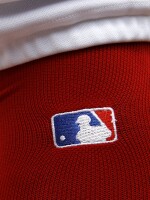Unilever, the British-Dutch conglomerate that owns Ben & Jerry's, Vaseline, Dove and more, announced plans Monday to halve its non-recycled plastic packaging by 2025. According to Unilever's statement, the company currently uses about 700,000 tons of plastic packaging every year.
In its announcement, Unilever pledged to invest in several alternatives, such as reusable and refillable materials. Its goal is to reduce plastic use by 100,000 tons. The remaining reduction will be covered by replacing new plastic with recycled materials.
The company also said it will collect and recycle over 600,000 tons of plastic every year.
"Our vision is a world in which everyone works together to ensure that plastic stays in the economy and out of the environment," CEO Alan Jope said. "Our plastic is our responsibility and so we are committed to collecting back more than we sell, as part of our drive towards a circular economy."
The company plans to set its 2018 plastic use as a baseline. By 2025, Unilever hopes to use no more than 350,000 tons of non-recycled plastic.
Greenpeace praised the announcement, but called for corporate transparency to ensure Unilever can be held accountable.
"One [way] is making sure they're doing public disclosure of all the data and progress so they're not just telling Greenpeace and the Ellen MacArthur Foundation, but they're going to be telling the public what their progress looks like, and being transparent about their plastics use in a much more open way than they have been historically," Graham Forbes, Global Plastics Project Leader at Greenpeace, said.
Forbes said Unilever's plans are the most ambitious he's seen from a massive conglomerate. He also said that Unilever should commit to more.
"While this is a step in the right direction ... Unilever's continued emphasis on collection, alternative materials, and recycled content will not result in the systemic shift required to solve the growing plastic pollution problem," Forbes said. "We encourage Unilever to prioritize its efforts upstream by redesigning single-use plastic and packaging out of its business model."
Greenpeace has been a constant critic of Unilever's environmental impact. In August, the group accused Unilever of breaking its promise to set up a deforestation monitoring platform.
Paolo Zialcita is an intern on NPR's News Desk.
Copyright 2020 NPR. To see more, visit https://www.npr.org.



